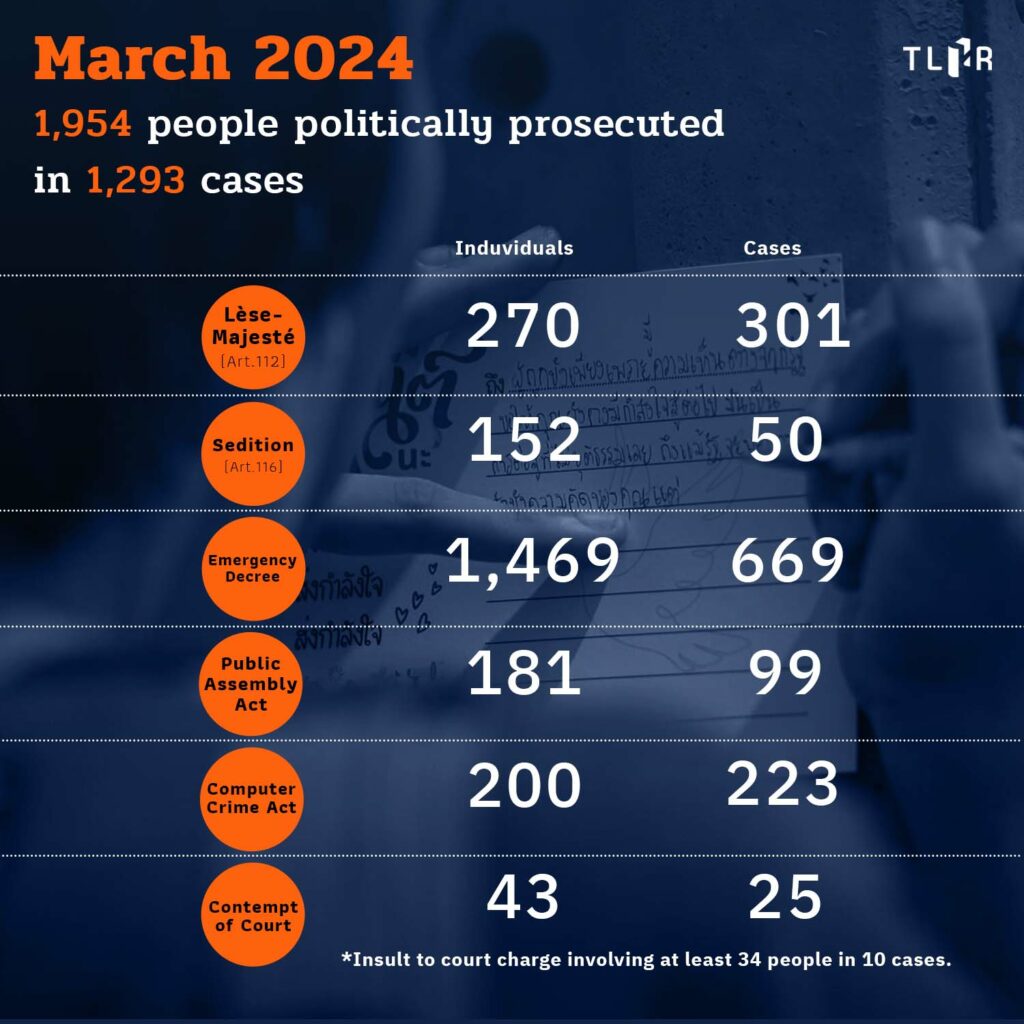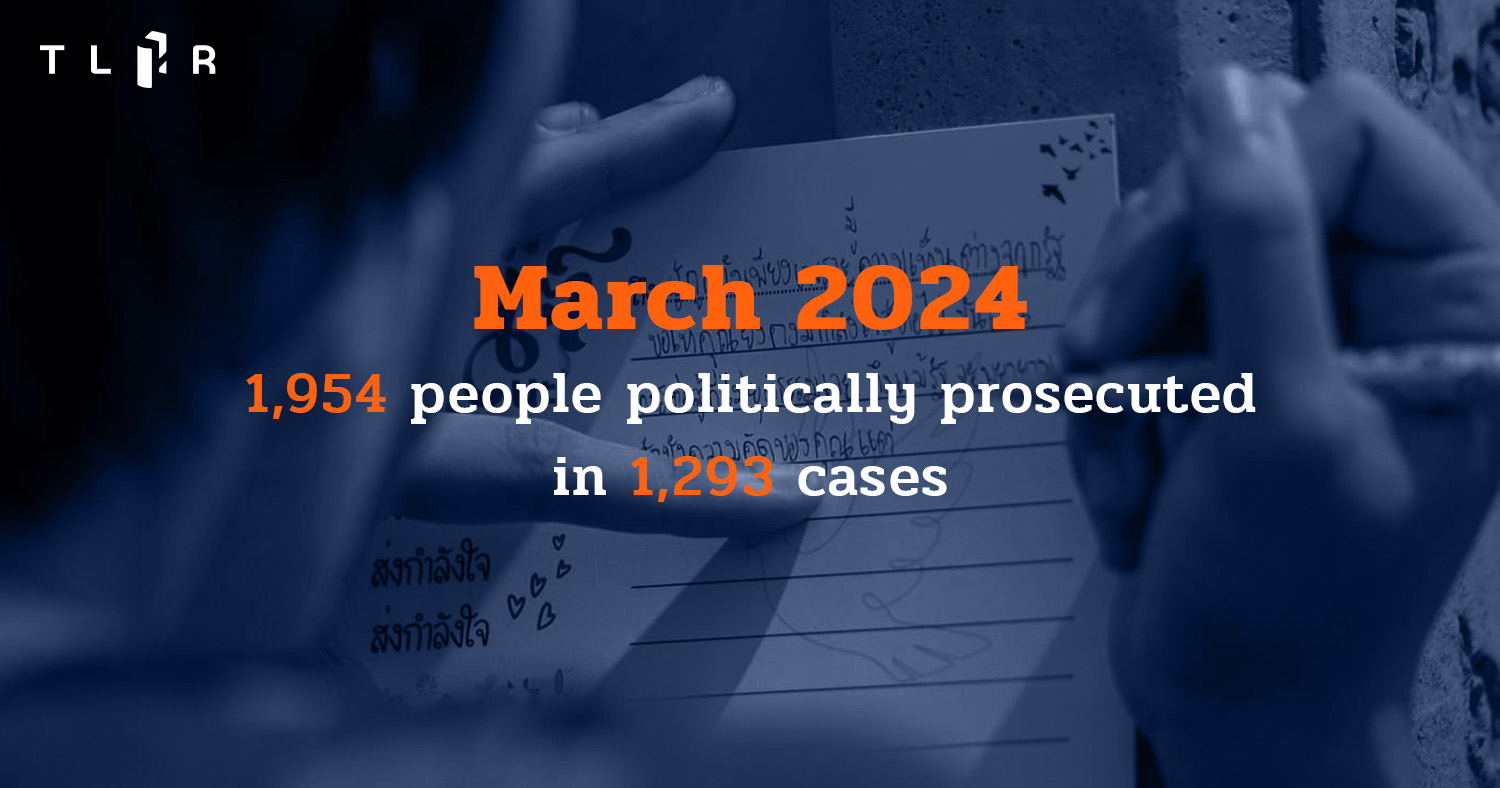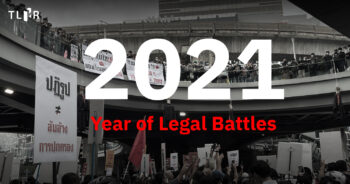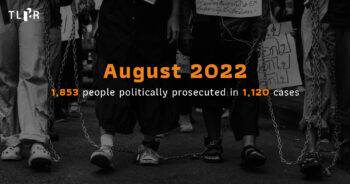In March, the number of lèse-majesté lawsuits filed since 2020 surpassed 300, with six new cases filed last month. More individuals are being imprisoned due to denial bail requests. Additionally, the police has pursued charges against participants of public assemblies, such as the P-Move protest during Srettha’s government era. Charges under the Emergency Decree are also being filed against participants involved in a Car Mob activity in 2021, despite the fact that the law was revoked after the Covid-19 pandemic.
According to the TLHR statistics, at least 1,293 cases related to political participation and expression have been filed against 1,954 individuals since the beginning of the “Free Youth” protest on 18 July 2020 until 29 February 2024.
Among these are 217 cases against 286 children and youth under 18 years old.
Since February 2024, three more people have been charged in 14 new cases (only counting those never been charged before).
If we are to count and include those charged redundantly in multiple cases, there would be at least 3,999 instances of prosecution in total.
The cases can be grouped according to key charges as follows:
1. The royal defamation or “lèse-majesté” charge under Section 112 of the Criminal Code: at least 270 people in 301 cases.
2. The “sedition” charge under Section 116 of the Criminal Code: at least 152 people in 50 cases.
3. Charges under the Emergency Decree: at least 1,469 people in 669 cases.
(Despite the lifting of the emergency situation, there has been a slight increase in Emergency Decree cases against protesters and political activists. New cases were filed based on previous events. Additionally, the courts have separated trials in cases involving multiple defendants who provided differing testimonies).
4. Charges under the Public Assembly Act: at least 181 people in 99 cases.
5. Charges under the Computer Crime Act: at least 200 people in 223 cases.
6. Charges under contempt of court: at least 43 people in 25 cases and insult to the court charge involving at least 34 people in 10 cases.
Out of the mentioned 1,293 cases, 545 have reached a conclusion, meaning over 748 cases are still ongoing at various stages.

The following key events have been observed as part of the prosecution trend in March 2024.
With six new lèse-majesté cases, the total number of cases filed since 2020 has soared to 301.
Based on our information, more than 300 people have been accused of/prosecuted with Section 112 of the Criminal Code, also known as the lèse-majesté law. Six new cases have been brought in March with two people being charged for the first time.
These include another lèse-majesté case, against prominent activist Parit “Penguin” Chiwarak, his 25th. The case was filed by the Thong Lor Police Station, after Pareena Kraikupt had filed a report there. In this case, Penguin is accused of a publishing a post on Facebook discussing the Supreme Court ruling on whether Gen. Prayuth Chan-ocha’s residency in a military residence after his retirement was lawful. Although the post was published in December 2020, Penguin was only summoned and notified of the charges by the police now.
Nawat “Amp” Liangwattana is facing his sixth lawsuit filed by Anon Klinkaew from the People’s Centre for the Protection of the Institution as a result of his speech at a protest in August 2023.
“Je Juang”, a crispy pork noodle seller, has also been charged under lèse-majesté, in her second lawsuit, at Bang Na Police Station. Her sister “Je Tiam”, who had never been accused before, was also charged for displaying banners/signs about the abolition of Section 112, the public budget, and a call for the “release of our friends” in front of the shop. The lawsuit was brought by a leader of the Protect the King Group.
TLHR has recently learned about the case against Nara, who has been charged with lèse-majesté for the second time due to a comment on Facebook in October 2020. We’re in the process of gathering more information on this case.
In two cases, Chinnawat “Bright” Chankrajang modified his testimony and pleaded guilty. As a result, the court asked the plaintiff to indict the rest of the activists, who decided to defend themselves in a trial, separately. Bright has been sentenced to an imprisonment of a term of one year and six months in the case related to the protest in front of Bang Khen Police Station on 21 December 2020 and a term of three years in the case related to the protest in front of the 11th Infantry Regiment on 29 November 2020. With the prison term in the other cases where he received unsuspended sentences, the total length of his prison time will be ten years. Appeals are being lodged in all cases.
As for the lèse-majesté trials, the courts have passed judgments in seven cases last month, with six by the Court of First Instance and one by the Court of Appeals.
One notable case is that against Maggy, a member of the LGBT community, who has been held in detention since their arrest due to 18 posts on X (formerly Twitter). Among these, 14 posts resulted in charges under lèse-majesté, while four were solely under the Computer Crime Act. Opting to confess before the Court, Maggy received a three-year sentence for each lèse-majesté count, totaling 42 years, and a two-year sentence for each count under the Computer Crime Act, amounting to eight years. The combined 50-year prison term was later reduced to 25 years.
This case is another one with heavy punishment due to multiple counts of offences. It has also resulted in Maggy being transferred from Bangkok Remand Prison to Klong Prem Central Prison after the judgment was rendered as per the prison’s regulations, as their sentence exceeds 15 years. Their case has yet reached a conclusion.
Meanwhile, student activist and human rights defender Sirapop “Kanun” Pumphuengputh, who made a speech at the protest on 18 November 2020, was given an unsuspended prison sentence of two years and was denied bail by the Court of Appeals. This makes Kanun the most recent political detainee to date.
The Nonthaburi Court dismissed the lèse-majesté charge in the case against “Sompol”, who threw red liquid at a royal portrait in Pakkred. This is in line with the judgments of other courts who deliberated on his cases containing similar allegations, seeing that the defendant only intended to cause damage to the property, and his action did not amount to insulting and threatening. Thus, he has been sentenced accordingly to a prison term of one year, reduced to eight months without suspension thanks to cooperation in the trial. He has been granted bail during appeal.
Another case under the Court of Appeals is that against “Arm”, a Koh Phangan resident who had to go to trial in Khampaeng Phet for posting a clip of his chatting with a cat on Tiktok. The public prosecutor lodged an appeal in this case, after the first court had originally sentenced Arm to a suspended prison term of one year and six months. Later, the Court of Appeals Region 6 has modified the judgment removing the suspension. That said, the court still granted his bail request during appeal to the Supreme Court.
The interesting part of this cae involves the role and decision of the public prosecutor. Among at least five cases lèse-majesté cases in Khampaeng Phet Province, which all received unsuspended sentences from the Courts, Arm’s case was the only one where teh public prosecutor lodged an appeal, despite the fact that the case was not substantially different from the others.
P-Move leaders notified of the charges at Dusit Police Station (source: P-Move Page)
P-Move leaders have been notified of charges under the Public Assembly Act in the first protest-related case filed during Srettha’s government. The police also charged the people involved in the Car Mob Activity in 2021 with the violation of the Emergency Decree.
As for the prosecution based on public assemblies, the first case of its kind during Srettha’s government came at the end of March. Two leaders of the People’s Movement for a Just Society (P-Move) were accused by police at the Dusit Police Station of violating the Public Assembly Act as a result of the demonstration in February 2024 at the Government House, which aimed to follow up on the government’s progress in solving land and natural resources issues. The police charged them in four different cases, including charges of organizing an assembly within the 50-meter radius of the Government House and marching protesters without notifying the authorities in advance.
As far as TLHR is aware, this series of cases are the first to relate to a public assembly taking place during the current government. Previous instances of prosecution were merely based on events that transpired before this government’s formation.
Authorities at the Thong Lor Police Station has pressed charges against Nattawut Saikua and Sombat Boonngamanong for their participation in the Car Mob Activity that occurred between the Asoke Intersection to the Democracy Monument on 19 September 2021. We have learned that they have been charged under Section 116 (sedition) of the Criminal Code and the Emergency Decree. The reason as to why the police only summoned them after over two years had passed since the incident remains unclear.
Seree Suwannapanin, a senator, has filed a report with charges of defamation by publication, causing damages to properties, and causing nuisances, against a group of activists, who affixed flyers at Seree 2 Market on 1 August 2023 to call upon the senators to listen to the people’s votes during the voting for Prime Minsiter. After the police from Wat the Phraya Krai Police Station notified the charges to Sophon “Get”, who was in prison, they proceeded to do so for the other three activists, as well as “Pe” and “Ya”, Prachatai journalist and independent photographer, who went to cover the said campaign. The prosecution against press members on duty is a matter that needs to be closely monitored.
In March, the courts passed judgments to dismiss three more Emergency Decree cases, including that of Khon Kaen Car Mob, protest on 13 Februry 2021 at the Democracy Monument, and the case against “Kanun” related to the 18 November protest. In Kanun’s case, the court may have acquitted him of the charge under the Emergency, but it found him guilty of lèse-majesté instead.
The case against Wevo guards that sold grilled shrimps at Sanam Luang towards the end of 2020 to help shrimp merchants was the only case last month found guilty by the Dusit Kwaeng Court. The Court reasoned that the 11 defendants had jointly organized the activity without disease prevention measures, screening stations, and registering on the app “Thai Chana”. Thus, the activity could not be considered safe in terms of disease transmission, despite no evidence indicating such an outcome. The court has sentenced all defendants to a fine.
Hunger strike by four political detainees
In March, the situation regarding the hunger strikes by Tawan, Frank, Bung, Busbas remains intense with the key demand being the release of all political detainees. Hunger strike has become one of few tools available to the detainees, where they rely on their bodies and physical suffering to call for social justice.
The police has sought maximum continuous detention (48 days as per the legal limit) for Tawan and Frank, who are charged under Section 116 (sedition) of the Criminal Code and accused of honking the car horn at a royal motorcade. In this case, even though the police had admitted that detention was not necessary and would not hinder the investigation during the pre-trial detention hearing, the court insisted on detaining the defendants in all four rounds.
Moreover, the public prosecutors issued an order of indictment only a few days after having received case file from the police. Although Tawan’s family has submitted seven bail applications in the past month while scholars, writers, and student groups have lodged requests for the court to deliver justice to the defendants, both Tawan and Frank continue to be detained and denied their right to bail and the right to a fair trial.




